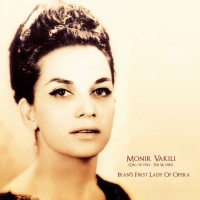Monir was born to a family of art and music enthusiasts. Her father encouraged her love of opera and supported her decision to study abroad. Monir studied voice and the Conservatoire National de Paris and continued her training in opera directing at the New England Conservatory of Music in the U.S. A pioneer in the true sense, Monir started the very first opera company in Iran. She gave performances as Madama Butterfly, Mimi in La Bohème, Violetta in La Traviata, Liu in Turandot, and many others at the Rudaki Hall. Her passion was to bring the level of artistry in Iran up to international standards. Among many other highlights in her illustrious career she produced and hosted a series in the National Iranian Television featuring the best selections from Rudaki Hall; she created an opera film festival which was the first of its kind in the world and established the Academy of Voice, a government-funded, co-ed boarding school to educate and train students in the art of opera and choral singing. In 1951 Monir placed first at the Berlin Youth Festival (vocal category) and in 1975 she was the recipient of the prestigious Forough Farrokhzad Award. Throughout Monir’s life, her love for her country permeated all of her work. A manifestation of this love is an album recorded in Paris in 1958, of songs from different regions of Iran. She dazzled the public and international critics with her performance, and the album, Chants et Danses de Perse, won the Grand Prix du Disque of the Académie Charles Cros. Monir died in 1983. The memory of her ever-lasting spirit and talent lives on in Baazgasht (“Resurrection”), a glorious rendition of the 1958 award-winning album.






